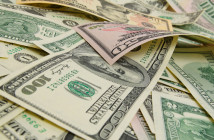The central bank may find itself rooting against Corporate America. After decades of being a cheerleader for rising corporate valuations, the US Fed is undergoing a massive reversal
Corporate America is about to show the US Federal Reserve how far behind the curve it is in terms of monetary policy. US companies begin disclosing their results for the first quarter this week, with the first up being the big banks led by JPMorgan Chase & Co. and Goldman Sachs Group Inc. These reports and the outlooks provided by company managers will likely provide a clearer picture of a fast-moving economy than most data being released at this time.
In a perverse way, the better companies do the more aggressive the central bank will have to be to push back against their success. Sure, the Fed doesn’t want to be in a position of actively trying to torpedo growth and demand, but it may have no choice if companies are providing evidence that they are able to easily push higher prices on consumers, thereby continuing to fuel the highest inflation rate since the early 1980s.
To be clear, I’m not saying the Fed is rooting against corporate America or hoping for signs of weakness among US households. In fact, central bankers are relying on economic momentum to achieve a so-called soft landing as it tightens monetary policy. They want households to be able to absorb higher borrowing costs, slower jobs growth, and fewer pay raises without pulling too far back on spending.
But the Fed is clearly very worried about companies being able to consistently pass on their rising costs to consumers and causing higher inflation expectations to become entrenched in the American psyche. Such a development has traditionally made it harder to get inflation under control. If companies show unabashed strength in their profits and outlooks, the Fed will likely have to tighten monetary policy more intensely and in ways that create greater risk of an economic downturn.
Federal Reserve Bank of Richmond President Thomas Barkin flicked at this reality in a recent conversation with Bloomberg Television’s Michael McKee, saying that one reason he’s ready to tighten more aggressively is because “I am still hearing companies say they have pricing power.” Jonathan Golub, the chief equity strategist at Credit Suisse Securities LLC, notes that earnings estimates for 2022 have risen by 1.8 percent. Bloomberg Intelligence projects that the S&P 500 Index’s earnings per share will end the year 37 percent above the pre-pandemic peak.
Corporate earnings are expected to be robust even with consumer sentiment the lowest since 2011 amid the fastest inflation since 1982. The government is forecast to say on April 12 that the consumer price index rose 8.4 percent in March from a year earlier, up from February’s 7.9 percent gain. Surveys show more households saying they’re planning to hold off on certain big purchases because of the greater expense.
Nevertheless, the trajectory of corporate earnings is still good enough for many investors to keep ploughing into US equities, arguing that there are few other places put money given that stocks offer better protection from inflation than bonds. It seems hard to believe with all that has happened this year, but the S&P 500 is just 6.43 percent below the all-time closing high on January 3. As a result, broad financial conditions haven’t materially tightened, and have even loosened at the margins as Fed Chair Jerome Powell fuels market bets on more than 200 basis points of interest-rate hikes through the end of the year.
Former New York Fed President Bill Dudley took it a step further in a Bloomberg Opinion column this week, saying that the central bank would essentially have to force stock prices lower in order to more effectively tamp down inflation. Whether you agree with Dudley, it’s clear that after decades of being a cheerleader for rising corporate valuations, the central bank is undergoing a massive reversal.
Equity bulls hope and expect that companies will continue to report growing profits, but as that happens, the Fed will be compelled to take a stronger stance in crimping demand. Ironically, if S&P 500 earnings reports are worse than expected, with signs of cooling inflationary pressure, the Fed may have an easier time navigating the competing pressures of a growth slowdown and inflation without sparking a recession.



